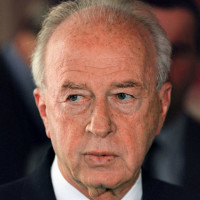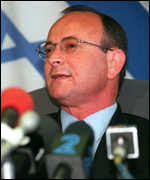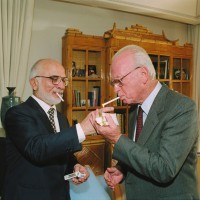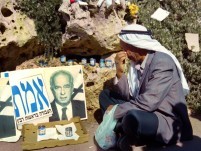Note: Our accounts contain the personal recollections and opinions of the individual interviewed. The views expressed should not be considered official statements of the U.S. government or the Association for Diplomatic Studies and Training. ADST conducts oral history interviews with retired U.S. diplomats, and uses their accounts to form narratives around specific events or concepts, in order to further the study of American diplomatic history and provide the historical perspective of those directly involved.
Seventy-three-year old Israeli Prime Minister Yitzhak Rabin was killed on November 4, 1995 by three shots fired by an Israeli rightwing nationalist who opposed the Oslo Accords. The assassination of came at the end of a peace rally in Tel Aviv in favor of the Accords. Rabin had served two terms as Prime Minister, from 1974-1977 and again from 1992 until his death.
In 1994, Rabin was awarded the Nobel Peace Prize along with PLO leader Yasser Arafat and Israeli Foreign Minister Shimon Peres. It was seen as potentially a huge step toward resolving the Arab-Israeli conflict, beginning with a partial Israeli withdrawal from occupied territories and the creation of a Palestinian Authority.  His funeral was held November 6 in the presence of leaders from eighty countries, including U.S. President Bill Clinton, Egyptian President Hosni Mubarak and King Hussein of Jordan.
His funeral was held November 6 in the presence of leaders from eighty countries, including U.S. President Bill Clinton, Egyptian President Hosni Mubarak and King Hussein of Jordan.
This account was compiled from interviews by ADST with James A. Larocco (beginning in 2011), Deputy Chief of Mission and Chargé d'Affaires in Tel Aviv 1993-1996 and Wesley Egan (2003), Ambassador to Jordan 1994-1998. You can read the entire account on ADST.org.
LAROCCO: It wasn't long after the Oslo Agreement that those who opposed this agreement, on either side, Palestinian or Israeli, took up their pens, their microphones or their weapons to sabotage it. In the streets of Jerusalem, in particular, but also in Tel Aviv, odious posters of Rabin began appearing more and more. I recall seeing in a suburb of Tel Aviv a march by Israelis opposed to the peace process with several men carrying a casket with Rabin's name on it.
This was at a time when the peace process itself seemed in jeopardy because of the increased terrorism. Rabin went into a funk for several weeks. When he came out of it, I happened to be accompanying a Congressional visitor for a call on him.
The visitor pressed Rabin on why he didn't press the pause button on the peace process until the situation calms down. Rabin responded that this is precisely what the terrorists wanted. They wanted Rabin to be reactive, to act as if he's terrorized by them.
Rabin then said words that have been repeated by others, but which I will never forget: I intend to take on terrorism as if there is no peace, and to work for peace as if there is no terrorism. These were powerful words, sending clear messages to all parties who had a stake in the success or failure of the peace talks.
I also remember the pressure we felt from the Israelis against our travel advisories. Any countries that take in significant revenues from tourism chafe at our travel advisories. I was at reception attended by the Mayor of Tel Aviv, Ronni Milo (seen right), and he talked about how safe Tel Aviv was, and then singled me out and the American Embassy for misleading foreign guests who were thinking about visiting Israel. Ironically, the very next day there was a terrorist strike in downtown Tel Aviv. We never heard another complaint from the Mayor's office, and over time, the Israelis learned to live with our travel advisories, as all countries do.
Ironically, the very next day there was a terrorist strike in downtown Tel Aviv. We never heard another complaint from the Mayor's office, and over time, the Israelis learned to live with our travel advisories, as all countries do.
As for the evening Rabin was assassinated, I was at home. Martin Indyk called me and said, "Rabin has been shot. Please come over to the house. We need to talk to the White House. There will be other things to do." I went over to the [ambassador's] residence. Martin said he must go to the hospital to see Rabin and his wife Leah, telling me to stay on the line with White House.
The week before, Martin and I went over to Rabin's residence to consult on talks related to Oslo II. The meeting broke up, and for some reason, I took longer than Martin to get out the door. As I was at the door, Rabin came up to me, grasped both of my hands in his, looked me in the eye and said "goodbye, Jim." At the time, I was spooked. Rabin was short on ceremony, and courtesies were not his forte. I couldn't get this out of my mind. I never saw Rabin again. He was dead within the week.
The Rabin funeral was only a few days after his assassination. We were seasoned handlers of VIPs, so they simply had to put themselves in our hands. There were some particularly poignant moments as younger congressmen helped older ones climb Mount Herzl together for the ceremony. The love and respect for Rabin was deeply felt. EGAN: I was at a dinner at the home of the Minister of Planning, Rima Khalaf. Rima got a phone call from the palace telling her that Rabin had just been assassinated. We were absolutely stunned.
EGAN: I was at a dinner at the home of the Minister of Planning, Rima Khalaf. Rima got a phone call from the palace telling her that Rabin had just been assassinated. We were absolutely stunned.
The King was profoundly affected because he considered Rabin a true partner in the effort to find a way towards peace. He respected him as a military man. (Rabin was a decorated soldier)
He thought that because he was a military man he could talk with him in ways that he couldn't with either the president of Israel or Shimon Peres. King Hussein in fact didn't particularly like Shimon Peres, thought he was a professional talker. But he liked Rabin.
They had known each other almost their entire lives, both as enemies and as political figures and as men. It was a very real and special relationship. The fact that Rabin was the man with whom Jordan had negotiated peace, and the man on whom they would rely for the implementation of the Israeli side of that peace treaty, made Rabin's assassination was a terrible blow.
The King went to Jerusalem for the funeral, played a very prominent public role in that funeral, and stayed in close touch with Rabin's widow.
There was never anyone who could have replaced Yitzhak Rabin in King Hussein's mind. It was obvious every time you saw them together. It worked and the systems that flowed from those two, the civilian government, the officials, the folks on the intelligence side and the folks on the military side, worked together in ways that reflected the empathy between Rabin and the King. Q: Sitting in Amman, when Rabin was killed, was there a feeling that at least a great start had been made and would continue?
Q: Sitting in Amman, when Rabin was killed, was there a feeling that at least a great start had been made and would continue?
EGAN: Yes. In the King's mind and in the mind of many Jordanians, Rabin was critical to the success of that relationship and the implementation of the treaty. The first question in many Jordanians' minds was, who was the killer? You can shudder to think what the repercussions would had been if his assassin had been a Palestinian, particularly a Palestinian rejectionist from Hamas or Islamic Jihad who had moved through Jordan on his way to Tel Aviv.
There was great fear at the time that the good work that had preceded Rabin's death would unravel. They worked hard, the Jordanians worked hard on the relationships that followed, because despite Rabin's death they obviously had an interest in pressing on...
